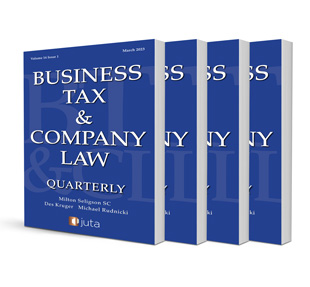
Supreme Court of Appeal Refuses ‘Reverse’ Piercing of the Corporate Veil
Author: Albertus Marais
ISSN: 2219-1585
Affiliations: Advocate of the High Court, CA (SA), Certified Tax Advisor (SAIT), Adjunct Senior Lecturer (UCT Law Faculty) and Director at AJM
Source: Business Tax & Company Law Quarterly, Volume 15 Issue 1, 2024, p. 1 – 8
Abstract
A company is a separate legal person in terms of South African law. That principle is also widely recognised in most countries. Sometimes, however, either through common law or statutory operation, the separate legal personality of a company may be ignored. Where a company’s separate legal personality is ignored for limited purposes, it is often referred to as a court ‘piercing the corporate veil’ of the company.
In South Africa, the piercing doctrine has historically been developed under the common law. More recently, however, that doctrine has now been incorporated into statute and, more specifically, section 20(9) of the Companies Act. The codification of the piercing doctrine is still rather new, and the recent case in The Butcher Shop and Grill is important because it reasserts the principles that have recently emerged in South African law in this regard.
That case is also important because it not only reasserts the interaction between section 20(9) and the common law but also because it deals with the interesting concept of so-called ‘reverse piercing’, that is, where a company’s shareholder approaches a court to have the separate legal personality of the company in which shares are owned disregarded. The Butcher Shop and Grill is important in this sense because it confirms the basic principle that a company is a legal person, the existence of which must at all times be acknowledged unless the separate identity of the legal person was the subject of abuse. This makes reverse piercing highly unlikely, if not impossible.